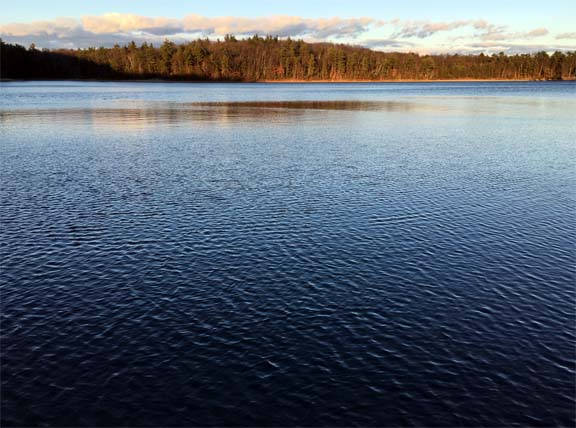(This post, written several years ago, reviews some of our previous lessons about wilderness in general and Walden Pond in particular.)
As we continue our History 453 visit to Walden Pond this weekend, I will show you more of the pond and its most famous resident, Henry David Thoreau. Along the way, I want to offer a corrective to some rather dire course material we have consumed lately on the seeming degradation of the American wilderness. In particular, in Patrick McManus’s “But, Papa, Where’s the Park,” and Roderick Nash’s “The Irony of Victory” we learned that even the popularity of wilderness parks can be their undoing. Too many tourists, too much trash, too tame animals.
In your comments and essays, many of you chimed in and joined the lament. In reaction, I have been thinking, “Hey, it is not that bad — not that bad at all!” My next thought is, “Where are my students getting all of these pessimistic ideas?”
Then I catch myself: “Oh, oh. I assigned this stuff!”
And of course I did, and these concerns about overcrowding and abuse of wilderness are definitely worth considering.
But here is something else to consider: those essays by McManus and Nash were written several decades ago. And yes, overcrowding is a problem, now more than ever. But in the mean time, scores of changes have come in park and wilderness management. I have visited a lot of national parks during the past four years and seen hardly any litter at all. Additionally the parks are generally attuned to recycling, something virtually unheard of when “Papa” could not find the park. The bears have been separated from the tourists. New ways of clean-energy transportation are moving visitors around the parks.
Case in point: Walden Pond, which is, as I have said, the most famous pond in the universe. About 600,000 folks visit the 353 acre reserve (woods and pond) each year. So what does this site tell us about nature appreciation in America today.
1. At Walden the park managers are dedicated to environmentally-friendly building in the spirit of Henry David Thoreau. Here are posters showing the plans for a new visitor’s center and book store, now completed:
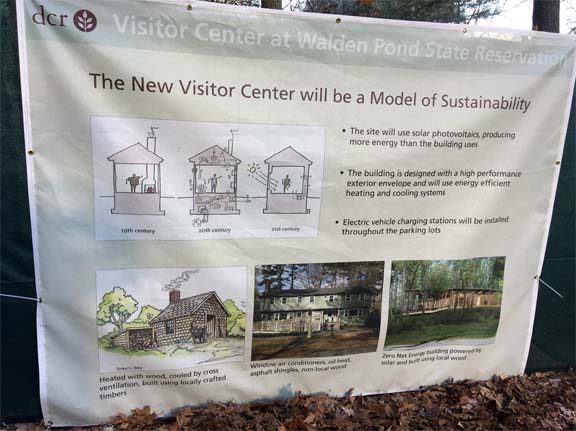
This poster shows three stages of building at Walden Pond: Thoreau’s cabin, the twentieth century visitor’s center, and the new visitor’s center that will “use solar photovoltaics, producing more energy than the building uses.”
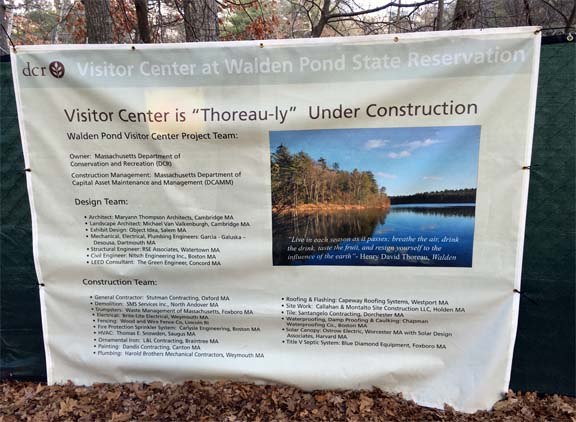
Note the play on words: the Thoreau-related visitor’s center will “Thoreauly built.” The quotation in the picture, from Henry David, reads: “Live in each season as it passes; breath the air, drink the drink, taste the fruit, and resign yourself to the influence of the earth.”
2. The park managers nurture the environment. Back in the day, when I was in college nearby, as we have seen, I used to come out to the hillside of the right of this picture and picnic and just “hang out.” Millions of tourists later that bank was sliding away, and so up went the fences. They are not aesthetic masterpieces, but they serve a purpose, and I have it on good authority, that the forest is grateful!
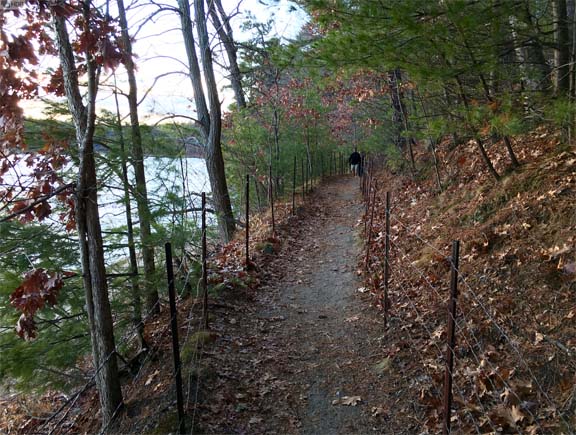
Here is another section of the trail, which goes about 1.5 miles around the pond:
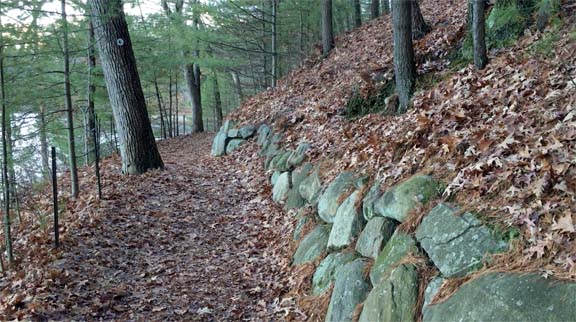
3. The park pays attention to environmental history. At no other place in America is a locale and a work of literature so fully integrated as at Walden Pond. Thoreau’s original cabin fell away long ago, but the house site is carefully marked in the woods near the pond with these stone pillars.
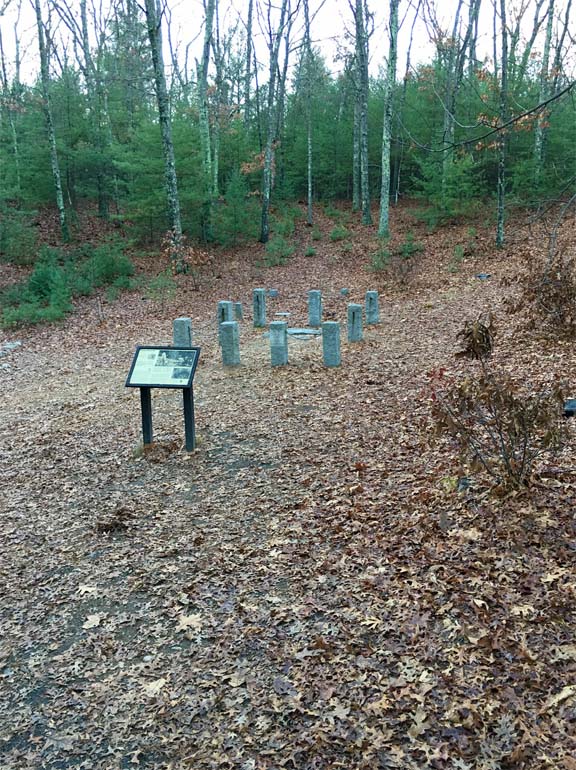
Nearby this sign commemorates Thoreau’s famous explanation in Walden for why he went to live here:
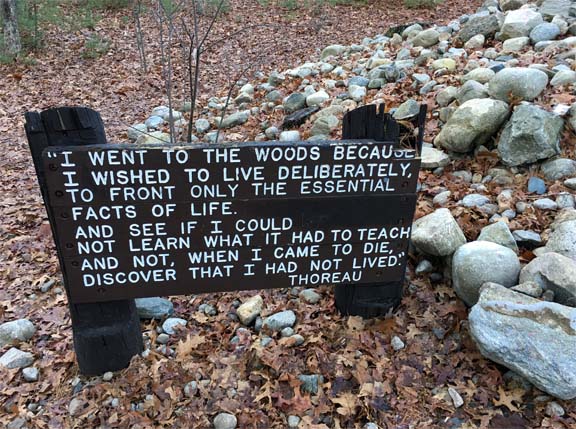
Do you notice those stones behind the sign. For decades people from around the world have been laying those stones there to honor Thoreau. I mean some day to bring a stone from Lake Pend Oreille — and someday I will.
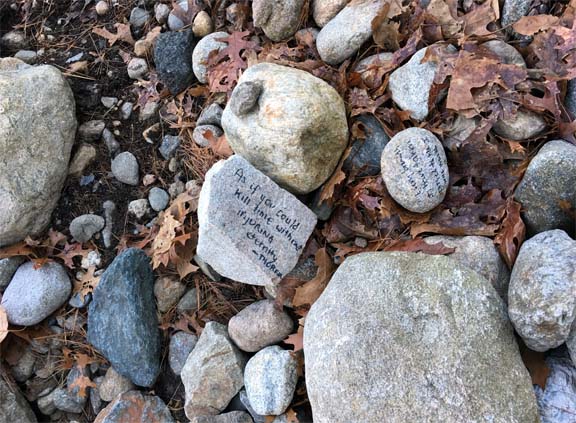
Sometimes visitors inscribe passages from Thoreau on the rocks they contribute to the pile. This one says “as if you could kill time without injuring eternity” — one of Thoreau’s most famous, and poignant, statements.
4. Finally, given a fair chance nature’s beauty will announce itself — so in my last two pictures I will let the pond “speak” for itself.
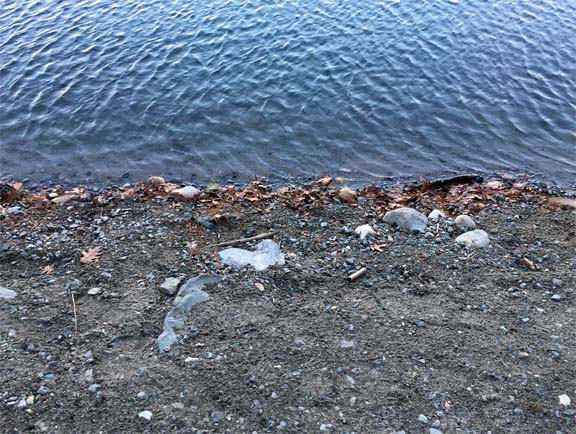
One of my favorite passages in Walden is this simple statement in which Henry David Thoreau expresses surprise and joy in “reconnecting” with his friend Walden Pond.
“Walden,” he writes, “is it you.”
“Yes,” Walden says to all of us in History 453. “I endure. I am here as healthy as ever!”
